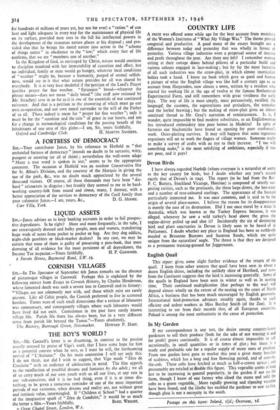Devon Birds I have always regarded Norfolk (where everyone is
a naturalist of sorts) as the key county for birds, but I doubt whether any year's record excels that of Devon's in 1945. The report (to be had from the Rev F. C. Butters, Stockland Vicarage, Honiton) is composed of utterly sur- prising rarities, such as the pratincole, the three large divers, the bee-eater and a number of rose-coloured starlings. The appearance of the bustard particularly interested me. It was once ,common, and is said to be the origin of several place-names. I believe the reason for its disappearance is merely the ease of its destruction. Did I not once travel by a train in Australia, which was known as the Turkey Express because, it was alleged; whenever he saw a wild turkey's head above the grass the engine-driver pulled up and shot it? Incidentally the sin of destroying bird and plant sanctuaries in Devon is likely soon to be heard of in Parliament. I doubt whether any place in England has been so ruthlessly mauled as Braunton Burrows and Saunton Sands, which are quite unique from the naturalists' angle. The threat is that they are designed as a permanent training-ground for Juggernauts.


























 Previous page
Previous page